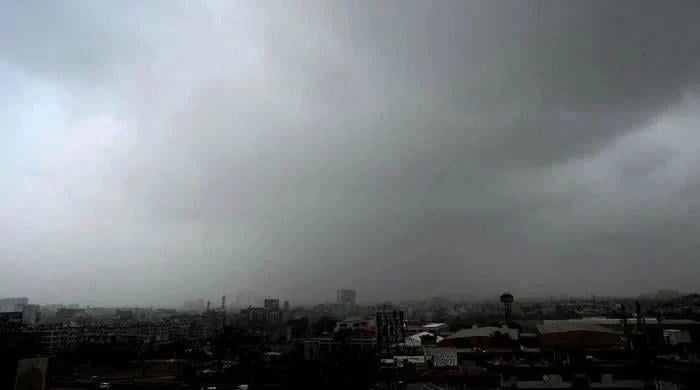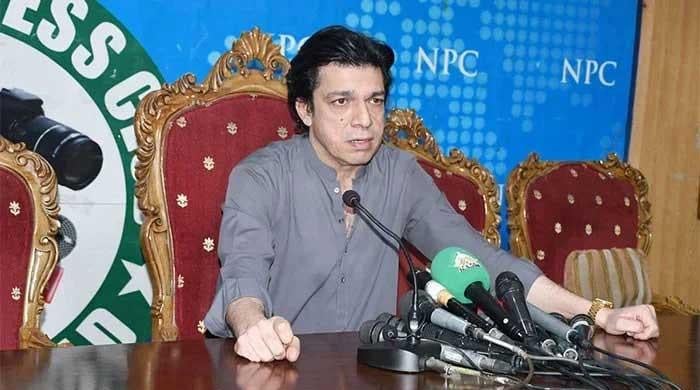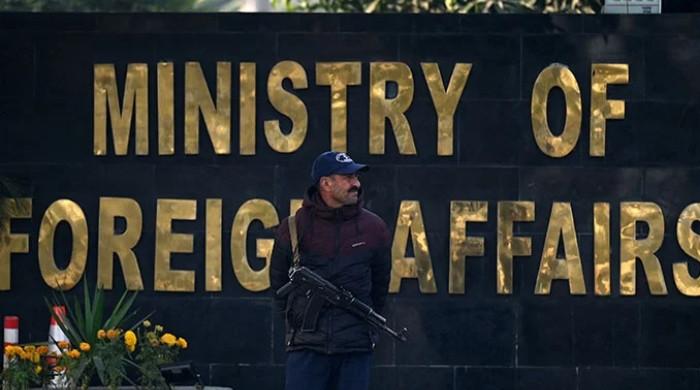'It takes two to tango': FM Qureshi on Indo-Pak relations
Qureshi noted how 'in his first speech, the prime minister made it clear that if [India] takes one step forward, we will take two'
August 25, 2018
ISLAMABAD: Foreign minister Shah Mehmood Qureshi on Friday stressed that a dialogue between India and Pakistan was essential for the bilateral relations to move forward, adding that Islamabad was "not shy of engagement".
Qureshi also noted how "in his first speech, the prime minister [Imran Khan] made it clear that if [India] takes one step forward, we will take two. We need positive signalling.”
Thanking the Indian external affairs minister for sending a congratulatory letter, the new foreign minister emphasised that "you need two to tango.”
“I want to ask the Indian foreign minister if there is any other option than dialogue. In my opinion, there isn’t," he said.
"When there is dialogue, regardless of the progress, the climate is improved.”
Qureshi added that everyone was aware of the Kashmir issue being a core one but there were other matters, such as the water crisis, that required discussion between the two South Asian neighbours.
‘First line of defence’
The Ministry of Foreign Affairs was the first line of defence for Pakistan, Qureshi said, and that there was a need to strengthen it. He added that PM Khan had said it needed to be more functional than before.
“This government will take foreign policy and engagements seriously,” he noted, adding that the spokesperson’s office would also be strengthened and there would be better communication with the media for an improved narrative building.
He cited India as an example, mentioning how its media and foreign ministry work closely to strengthen the narrative.
'Need to explore African markets'
Speaking of how Pakistan needs to become more active in global terms, Qureshi said the country could use international forums to its benefit. He said the South Asian Association for Regional Cooperation (SAARC) was an important forum and Pakistan considered this a good vehicle for regional cooperation.
“Unfortunately, we have not benefited from it like we should have," he lamented.
Further, Qureshi added that while the European Union (EU) offered several trade opportunities to Pakistan, the nation was unable to benefit from the GST-plus opportunity.
The foreign minister said Islamabad also needed to look towards Africa.
“I have to admit that, in the past, we have not concentrated on Africa. Today, there are several opportunities there.
"If we are to achieve growth, we need to explore African markets.”
When asked why Khan was not attending the United Nations General Assembly (UNGA) session, Qureshi responded by saying the premier was rather more focused on internal challenges at present.
'Will prefer business class'
On the other hand, Qureshi said he had decided to not stay in the five-star hotels during foreign official trips, as per Khan's directives on an austerity drive.
"I will try to stay in our embassies wherever possible. The foreign minister has the legal authority to travel first class but I will not do this and will prefer business class travel.
"We will try to avoid big delegations and have limited entourage," he said.
In view of curtailing any unnecessary foreign trips, the foreign minister said no minister or secretary would be allowed to fly abroad without the prime minister's permission.
“We should try to save as much foreign exchange as possible. The objective of this is to evaluate what will be the benefit of travelling abroad to Pakistan.
"If there is no need to travel abroad, it should be avoided," he said.
Overseas Pakistanis 'should lobby'
Also, the foreign minister spoke of how the Khan-led government intended to use the overseas Pakistanis for the country’s benefit. He said the approximately 9.2 million expatriates were happy as their demand to vote is now set to become a reality.
The overseas Pakistanis "should lobby for the country", he said, adding: "I want them to help us and help share the burden of our country. I want to give them importance in my interactions.”
FM visits
Qureshi's Chinese, Iranian, and Japanese counterparts would visit Pakistan soon, he informed reporters, adding that Tehran's foreign minister, Javad Zarif, had sent a message to visit Islamabad sometime around August 30-31.
“We will welcome the Iranian Foreign Minister on his Pakistan visit,” he said.
On tensions between Tehran and Washington, the foreign minister said: “Iran is a neighbour of Pakistan and we share a large border with them. We want a peaceful stable border.”
While speaking of the upcoming visit of the Chinese foreign minister — who was expected to arrive in the country on September 8, three days after the arrival of US Secretary of State Mike Pompeo — Qureshi stressed the importance of the China-Pakistan Economic Corridor (CPEC) and the historic Sino-Pak friendship.
According to Qureshi, his Japanese counterpart was also expected to visit Pakistan at the end of August.









